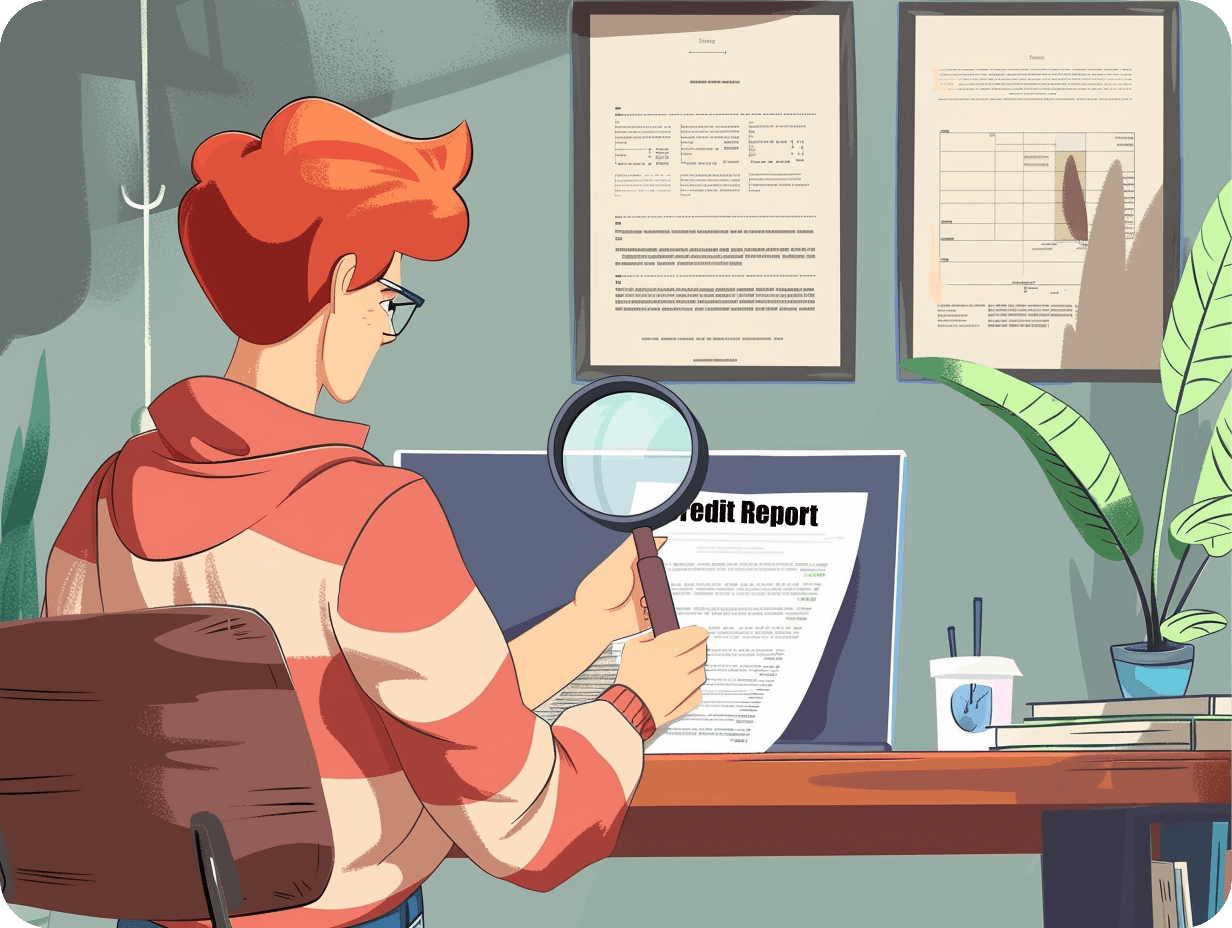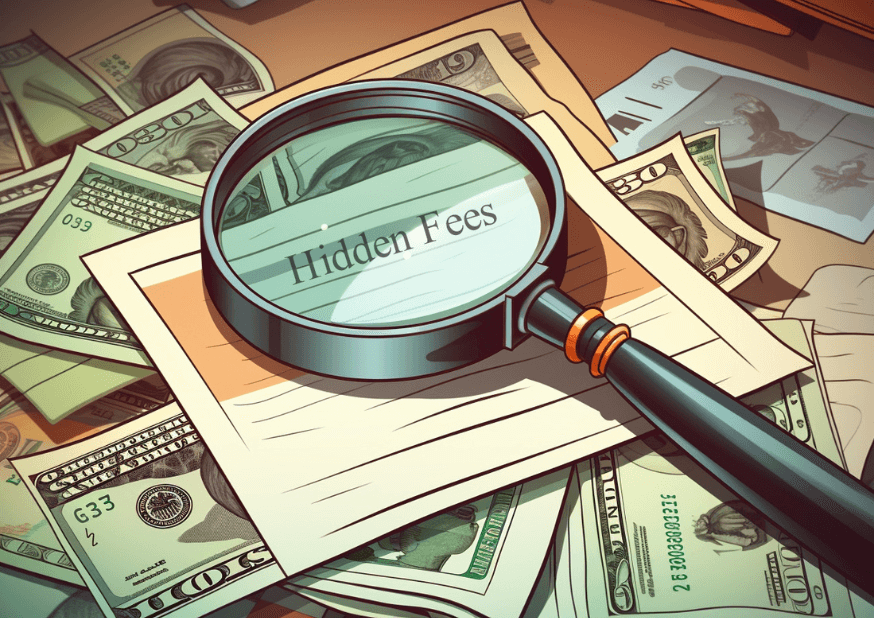- Blogs
- /
- How to Read a Credit Report in 3 Easy Steps
How to Read a Credit Report in 3 Easy Steps

Summary
Ever checked your credit report and felt like you were interpreting an ancient scroll written in a language only experts understand? Trust me, you’re not alone. Navigating the world of credit reports can feel like wandering through a maze blindfolded.
Understanding your credit report would help you get more information about your financial life. That’s because it’s the roadmap to your creditworthiness, and knowing how it works can open doors to better rates, smoother approvals, and overall financial freedom.
In this guide, we’ll demystify credit reports, strip away the complex financial jargon, and give you the knowledge to read and truly understand your credit report. So, grab your coffee, get cozy, and embark on this enlightening journey together.
Ready? Let’s dive in!
Key Takeaways
- Mastering how to read a credit report can empower you to make informed decisions.
- Your creditworthiness influences your loan approvals, interest rates, and overall financial freedom.
- You can get free copies of your credit report from annualcreditreport.com.
- Your credit report contains these segments: personal information, credit accounts, employment records, public records, credit inquiries, collections, and credit score.
- Avoid making mistakes like ignoring inaccuracies, neglecting closed accounts, and failing to take action.
- To build your credit score, you should always pay your bills on time, maintain low credit balances, and keep old accounts open.
- Regularly monitor your credit report, set up alerts for changes, and take proactive steps to address discrepancies or issues.
What is a Credit Report
A credit report is a detailed record of your credit history compiled by credit bureaus. It contains information about how much you borrow and how well you repay borrowed money, which helps creditors and lenders assess your creditworthiness.
The three major credit bureaus, Equifax, Transunion, and Experian, compile this information from several sources, from creditors to lenders, public records, and collection agencies.
That said, here’s how to read a credit report.
How to Read a Credit Report: Fast and Easy

Step 1: Get a Free Copy of Your Credit Report
You can get a free copy of your credit report from the three credit bureaus when you visit annualcreditreport.com. The federal government fully authorizes the site to provide free credit reports.
When you visit the site, you’ll be asked to provide personal information, such as your name, address, social security number, and date of birth. Don’t worry; this information only confirms your identity and ensures you get the right credit report.
Once your identity has been confirmed, you’d have to choose which credit report you’d like to see. You can choose to see your credit reports from one, two, or all three credit bureaus. The best way to get a balanced view of your credit standing is to go for all three.
That said, since the pandemic, the site has been offering weekly updates to credit reports so folks can get an instant sense of their credit performance.
Step 2: Know the Key Components of Your Credit Report
1. Personal information
This segment of your credit report is like a snapshot of your financial identity. It contains your name, previous and current address, social security number, email address, phone number, and date of birth.
You must understand that even though this information doesn’t affect your credit score, it helps lenders verify your identity.
Always pay attention to your personal information when reading a credit report. Watch out for addresses and phone numbers that aren’t yours since this could indicate that someone else has opened a fraudulent account with your personal information.
2. Credit Accounts
This section outlines all the types of accounts you have. From credit cards to loans, mortgages, and lines of credit. Each account type contains detailed insights into how you manage different forms of credit.
You’ll see the current status of each account, whether it’s open, closed, or in collections. It’s essential to review this carefully to ensure accuracy and identify any accounts needing attention, like those in collections or with late payments.
This segment offers a comprehensive look at your credit behavior and financial obligation and also contains information like your:
- Payment history
- Balances and credit limit
- Account age
- Lender’s information
- Notes from lenders
Also, remember to pay special attention to whether the payment history and credit limit shown on your accounts are accurate since they’ll significantly wreck or boost your credit score.
3. Employment Records
Your credit report may also include details about your employment history, such as your current and previous employers.
Yes, this information isn’t used to calculate your credit score since it has nothing to do with your debt. But, it can help lenders verify your identity and assess your financial stability.
Watch out for employers and companies you never worked for since this could signify identity theft.
4. Public Records
This part of your credit report shines a light on any public-facing area of your financial life. How so? For starters, it reflects any bankruptcy filings you may have made.
And yes, bankruptcy might seem like a fantastic reset button, but it can stay on your credit report for seven years and severely impact your score.
If a creditor takes legal action against you and wins, a judgment could appear on your credit report. But that’s not all. If you’ve had a foreclosure, civil judgment, repossession, eviction, or tax liens, they could all appear in this section of your credit report.
Negative information on your public records indicates to lenders that you failed to resolve a debt through negotiation or repayment, which can severely affect your creditworthiness.
So, make it your goal to address every entry on your public record and improve your credit standing.
5. Credit Inquiries
This segment would give you an idea of who’s been looking at your credit report. It contains sub-segments like:
Regular Inquiries (Hard Inquiries)
This usually shows up when you’re actively seeking credit. Whether it’s for a mortgage, car loan, or credit card, lenders will typically conduct a hard inquiry to assess your creditworthiness.
These inquiries stay on your report for up to two years and can slightly impact your credit score by 5-20 points, so keep them to a minimum.
Account Review Inquiries (Soft Inquiries)
Unlike regular inquiries, soft inquiries only appear when companies or people check your credit report for reasons other than extending credit, like pre-approved offers or background checks. And yes, soft inquiries don’t affect your credit score and are typically only visible to you.
While we’re still on inquiries, rate shopping is a handy feature when you’re looking for the best loan or credit card deal.
Here’s how it works: If you apply for multiple loans of the same type within a short timeframe, like a mortgage or auto loan, they’re often treated as a single inquiry.
This feature recognizes that you’re likely rate shopping and minimizes the impact on your credit score.
It’s important to note that you could sometimes notice inquiries from credit monitoring services or yourself (if you’ve checked your own credit). These are harmless and won’t impact your credit score in any way.
6. Collections
This section of your credit report is where you’ll find information about any accounts sent to collections due to unpaid debts.
It lists accounts handed over to collection agencies because you haven’t paid them as agreed. You’ll see details like the collection agency’s name, the original creditor, the amount owed, and the status of the collection account.
Accounts in collections can significantly negatively impact your credit score. They signal to potential lenders that you’ve had trouble managing your debts, making you a higher risk for future loans or credit cards.
And this can tank your credit score, making it harder to qualify for new credit or loans. The longer an account remains in collections, the more damage it can do to your credit.
You must take action if you spot any accounts in collections on your credit report. Start by verifying the information is accurate, as errors can sometimes appear on credit reports.
If the debt is legitimate, consider contacting the collection agency to negotiate a payment plan or settle the debt.
7. Credit score
Your credit score is a three-digit representation of your financial position. It summarizes your creditworthiness based on the information in your credit report.
Think of it as a grade for how well you manage your finances. Lenders use it to assess the risk of lending you money.
Although the exact formula for calculating your credit score is still a closely guarded secret by credit bureaus, several factors play into it. These factors include your payment history, credit utilization, length of credit history, types of credit accounts, and recent credit inquiries.
Your credit score has a significant impact on your financial life. It determines whether you’ll qualify for loans, credit cards, or favorable interest rates.
A higher score opens doors to better financial opportunities, while lower scores can make borrowing more expensive or challenging.
Step 3: Check and Dispute Inaccurate Information
After getting your credit report from the three main credit bureaus, you should first study them and find any flaws or inaccuracies. Then, check your accounts, personal information, and credit inquiries.
If you discover any incorrect information, like a mistaken name, phone number, or address, you need to dispute it with the credit bureaus quickly. You can dispute every inaccurate information on your credit report by visiting the credit bureau’s website.
After you submit a dispute, the credit bureau is legally required to verify the information on your report with the lender they got it from.
If your claim is true, the error will be removed or amended on your credit report. Disputing inaccuracies on your credit record might significantly increase your credit score.
What Information isn’t on Your Credit Report

Your credit reports show your credit history and accounts. But it’s vital to recognize and understand what information they don’t contain.
1. Personal information
Your credit report doesn’t include personal details like your race, religion, marital status, or income. These aren’t included in your credit report because they are irrelevant to your creditworthiness.
2. Bank Account Balances
Your credit report doesn’t list your bank account balances or transactions. While your banking activity may impact your financial health, it’s not considered when calculating your credit score or assessing your creditworthiness.
3. Medical History
Your credit report doesn’t include information about your medical history or healthcare expenses. Medical bills typically only appear on your credit report if they’ve been sent to collections for non-payment.
4. Criminal Record
Your credit report doesn’t contain information about your criminal record, including any arrests, convictions, or legal proceedings. Lenders calculate your creditworthiness based on your financial behavior, not your criminal history.
5. Rent and Utility Payments
Although timely payments for utilities like rent, electricity, water, and gas may reflect positively on your financial responsibility, they are generally not reported to credit bureaus unless they fall into collections.
However, using Experian Boost can help you add utility payments to your credit report. All you’ve got to do is link Experian Boost to your bank account securely. This allows Experian to access your payment history for eligible bills.
Next, review and confirm the bills you want added to your credit report. Once you add them, Experian automatically adjusts your credit score to reflect the impact of the added payments.
6. Child Support Payments
Payments related to child support or alimony obligations are generally not reported to credit bureaus. But, if you fall behind on these payments and they get referred to collections, they may appear on your credit report as delinquent accounts.
5 Mistakes to Avoid When Reading Your Credit Report
1. Ignoring Errors
One big mistake is brushing off errors on your credit report as insignificant. Remember, even small mistakes can impact your credit score and financial health.
Take the time to carefully review each section of your report for inaccuracies, and dispute any errors with the credit bureaus.
2. Not Checking Regularly
Another blunder is failing to check your credit report regularly. Your credit report can change frequently due to updates from creditors, so it’s essential to review it at least once a year, if not more often.
Regular monitoring can help you catch errors early and spot any signs of identity theft or fraud.
3. Forgetting About Closed Accounts
When reviewing your credit report, don’t overlook closed accounts. Even though these accounts are no longer active, they still affect your credit history and can impact your credit score.
Make sure closed accounts are reported accurately and reflect your payment history correctly.
4. Not Understanding Terms
Failing to understand the terms and terminology used in your credit report can lead to serious confusion.
So ensure you take the time to familiarize yourself with terms like ‘credit utilization,’ ‘charge-off,’ and ‘public records.’ By getting this primary understanding, you’ll be in a better position to interpret your report accurately.
And if you’re ever unsure about any terms or information, don’t hesitate to ask a trusted financial advisor or credit counselor for more information.
5. Not Taking Action
The most significant mistake people often make when trying to improve their credit scores is failing to take action after reviewing their credit reports. So, if you identify errors or discrepancies, it’s crucial to dispute them with the credit bureaus quickly.
Also, if you spot areas where you need to improve, like reducing your high credit card balances or improving your payment history, take steps to address them and improve your credit health.
By staying proactive and taking action, you can work towards achieving your financial goals and maintaining a healthy credit profile.
Why are Credit Reports Important?

Credit reports play a vital role in today’s society. They give insight into your financial journey, showing how you’ve managed credit and debt over time. But that’s not all. They can:
Evaluate Creditworthiness
Your credit report tells a story about how you handle money. Lenders look for signs of financial responsibility, like paying bills on time, managing debt wisely, and staying within credit limits.
Lenders want to feel confident that borrowers will pay back what they borrow. Having a solid credit report with a history of on-time payments and responsible credit use signals that you are trustworthy and reliable.
Rental Applications
Renting out a property is like inviting someone into your home—you want to ensure they’ll take care of it. This is where credit reports come in.
Credit reports help landlords assess the risk associated with each applicant by showing any past debt issues, like late payments or accounts in collections. This helps landlords make more informed decisions about who to trust with their property.
Renting out property is a significant investment for landlords, both financially and emotionally. Using credit reports as part of their screening process helps reduce risks associated with non-payment of rent or property damage.
Detect Identity Theft
Your credit report is like your reputation in the financial world. It speaks volumes about your trustworthiness and reliability even when you’re not in the room. But identity thieves can easily use this against you.
However, monitoring your credit report protects your financial reputation from being tarnished by fraudulent activity.
Catching and addressing discrepancies promptly can help maintain your credibility and trustworthiness in the eyes of lenders and financial institutions.
Assist in Financial Planning
If there’s anything everyone can agree on, it’s that life is full of twists and turns. Your financial plan should be flexible enough to adapt to changing circumstances.
Your credit report serves as a compass, guiding you through unexpected challenges and helping you adjust your financial strategy as needed.
Whether you’re facing a job loss, medical emergency, or other unforeseen events, your credit report provides valuable insights to help you navigate turbulent waters and stay on course toward your financial goals.
Quick Tips to Build Your Credit Score
Tip 1: Pay Your Bills on Time
Your payment history is one of the most significant factors in your credit score. Make it a priority to pay all your bills—including credit cards, loans, and utilities—on time, every time. Set up automatic payments or reminders to ensure you never miss a due date.
Tip 2: Keep Your Credit Balances Low
Aim to keep your credit card balances well below your credit limit, ideally using less than 30% of your available credit. High credit utilization can negatively impact your credit score, so pay down balances whenever possible and avoid maxing out your cards.
Tip 3: Build a Mix of Credit
Lenders like to see that you can manage different types of credit responsibly. Consider diversifying your credit portfolio with a mix of credit cards, installment loans like auto loans, personal loans, and retail accounts. Just be sure to use them wisely and avoid opening too many new accounts simultaneously.
Tip 4: Don’t Close Old Accounts
Closing old credit accounts can shorten your credit history and reduce your overall available credit, which may negatively impact your credit score. Instead, keep your oldest accounts open and active, even if you’re not using them regularly.
Tip 5: Become an Authorized User
If you have a trusted family member or friend with a good credit history, consider becoming an authorized user on one of their credit accounts. This can help you piggyback off their positive credit history and boost your score.
Constantly Monitor and Take Action
Taking control of your financial destiny begins with understanding and regularly monitoring your credit report.
By reviewing your credit report frequently and setting up alerts for any changes, you empower yourself to stay proactive in safeguarding your financial well-being. Don’t hesitate to take action if you encounter any discrepancies or issues.
Whether you dispute errors or prevent identity theft, every proactive step you take brings you closer to financial security and peace of mind. So, stay vigilant, stay informed, and take charge of your credit journey. Your financial future is in your hands.
FAQs
How important is understanding Credit Report Basics?
Understanding Credit Report Basics is crucial as it forms the foundation for financial health management. It helps you comprehend how credit information is presented, what factors affect your credit score, and how to interpret the data accurately.
What kind of information falls under Personal Information in a credit report?
Personal Information includes your name, address, social security number, date of birth, and employment history. Ensuring this information is accurate is essential, as errors can impact your creditworthiness and ability to access credit.
How does the Public Records Impact section influence my credit report?
The Public Records Impact section highlights any legal actions such as bankruptcies, tax liens, or judgments against you. These negative records can significantly lower your credit score and make qualifying for new credit or loans challenging.
Why are credit inquiry effects vital to monitoring in a credit report?
Credit Inquiries Effects show the instances where potential lenders or creditors have accessed your credit report. Multiple inquiries within a short period may signal financial distress to lenders and potentially lower your credit score.
What steps should I take if I find Discrepancies and Errors in my credit report?
If you identify any Discrepancies and Errors in your credit report, promptly dispute them with the credit bureau by providing supporting documentation. Correcting inaccuracies can help improve your credit score and ensure a fair representation of your financial history.
Our Latest Blogs:

ThisIsJohnWilliams
FREE Strategy Session to Fix Your Credit Blogs / During credit repair, shortcuts and quick fixes can be tempting....

ThisIsJohnWilliams
FREE Strategy Session to Fix Your Credit Blogs / Facebook Twitter Linkedin Instagram Share Summary Say you’ve finally found...

ThisIsJohnWilliams

ThisIsJohnWilliams
FREE Strategy Session to Fix Your Credit Blogs / Facebook Twitter Linkedin Instagram Share Summary Credit cards have made...

ThisIsJohnWilliams
FREE Strategy Session to Fix Your Credit Blogs / Facebook Twitter Linkedin Instagram Share Summary Banks allow customers to...






